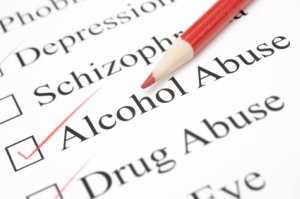Lesson 19: Substance Abuse in Late Adulthood
Attention

Learning Outcomes
Upon completion of this lesson's material, students will be able to:
- Identify barriers to successful substance abuse treatment from a rehabilitation provider's perspective
- Research alternative treatments and interventions for elderly clients
Teaching
Read Chapter 13 in Cohen & Eisdorfer
There is a myth that substance abuse is not common among the elderly. Abuse may be mistaken for other assumed disorders such as dementia. As with any age, there are dire consequences related to untreated substance abuse.
Substance abuse among the elderly: A growing problem
Article published on the Hazelden website
Potential consequences of substance abuse include:
- complications of medical conditions
- impaired quality of life
- domestic violence
- intentional or unintentional injury
- long-term family problems
One confounding issue is that as we age we become more susceptible to the effects of substances. So, if someone is used to drinking a case of beer in a sitting, as they age this has a more severe impact on them.
Sensitivity is related to total body mass and total body water...both of which decrease as we age. Interactions with medications that the older person may be taking may also cause problems.
Alcohol Abuse
According to the DSM-IV-TR, Alcohol Abuse is an identified pattern of alcohol use with at least three of the following symptoms at the same time over a 12-month period:
- need for significantly increased amounts of alcohol or diminished effect with continued use of the same amount of alcohol
- presence of the characteristic withdrawal syndrome or alcohol / medications being used to relieve or avoid withdrawal
- alcohol used in larger amounts or over a longer period than intended
- unsuccessful efforts to control alcohol intake
- significant efforts to obtain alcohol or recover from intoxication
- withdrawal from social, occupational, or leisure activities because of alcohol use
- continued drinking despite knowledge of serious medical risks
This fails to capture the unique characteristics of alcohol abuse in older populations.
- older cohorts are not as educated as to the effects of alcohol on medical conditions
- consumption thresholds are different
- lack of tolerance may be present due to late onset of the substance use problem
Alcohol as Medication
We often feel that alcoholism is a way of escape or coping with the many issues that people may have. We have already identified that the elderly may have a lot on their plate. Consider the following scenarios related to drinking:
Early Onset vs. Late Onset Drinking
Most elderly people with drinking problems have had drinking problems for a long time. These people are different from late onset drinkers (about 1/3). This 1/3 are usually more willing to seek help.
Intermittent Problem Drinking
Characterized by a history of periods of heavy drinking. May occur as a response to events.
Problem Focused Drinking
This is the type of drinking that is related to a specific situation, such as loneliness, loss, health issues, legal and financial issues, etc. (Incidentally, these are also all risk factors related to drinking)
Screening Tools
Many of you may have taken the Substance Abuse class and have come across some of these tools. The CAGE, AUDIT, and MAST tests are reviewed in your textbook.
Click HERE to view the CAGE
Click HERE to view the AUDIT
Click HERE to view the MAST
Treatment
The potential impact of the baby-boom generation on substance abuse among elderly persons
Read the part on the issues related to treatment
Substance Abuse and the Elderly: Unique Issues and Concerns
Read the part on treatment that is on P. 47 of this article
Assessment
Lesson 19 Discussion
In this discussion I would like each of you to reflect on the section titled "Treatment" in the article "Substance Abuse and the Elderly: Unique Issues and Concerns". Of particular interest is the section on what "Rehabilitation Professionals" tend to do. That is US! Let's see if we can research other options for treatment for our elderly consumers.